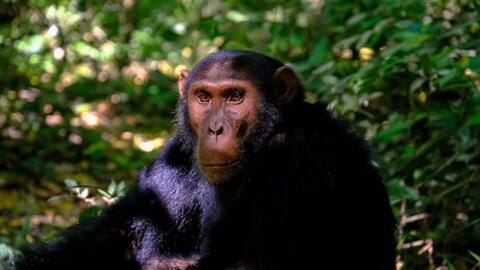Chimpanzees display ability to mimic human speech, researchers reveal
What's the story
In a groundbreaking revelation, researchers have discovered that chimpanzees can produce sounds mimicking human speech. This finding was reported in a recent scientific paper, building upon earlier research that demonstrated chimpanzees' ability to use gestures in conversation similarly to humans. The team's analysis of two archived videos from the mid-2000s and the 1960s showed chimpanzees uttering the word "mama" when prompted by their handlers, challenging previous assumptions about their neural capabilities.
Ape speech
Chimpanzees' vocal capabilities underestimated, suggests study
The research paper stated, "Great ape vocal production capacities have been underestimated. Chimpanzees possess the neural building blocks necessary for speech." This conclusion indicates that primates can control their speech and jaw muscles to produce consonant and vowel sounds. The findings challenge the long-held belief that speech was beyond the neural circuitry of chimpanzees, suggesting a greater complexity in their communication abilities than previously thought.
Video evidence
Archived videos provide evidence of chimpanzees' speech abilities
In one of the videos, filmed at Suncoast Primate Center in Palm Harbor, Florida, a chimpanzee named Johnny was observed saying "mama" in exchange for a red Twizzler when prompted by a caretaker. Johnny's deep-pitched cadence was likened to Andy Serkis's English-fluent chimpanzee Caesar from the Planet of the Apes film franchise. According to the video's origin, Johnny had learned that uttering "mama" would earn him anything he desired within his diet.
Historical evidence
1960s footage reinforces chimpanzees' speech mimicry
A 1962 footage of Renata, a chimpanzee in Italy, further substantiated the research findings. In this video, Renata was seen uttering the word "mama" when given a touch to the chin by a human. Researchers referred to this as a form of "reinforcement learning," and noted that "Renata reliably produced "mama." This evidence from over half a century ago supports the claim that chimpanzees possess necessary control for human-like speech.
Self-medication
Chimpanzees' self-medication with medicinal plants
In another study, scientists have found that wild chimpanzees use plants with pain-relieving and antibacterial properties to heal themselves. While conducting research in the forests of Uganda, they observed chimpanzees that appeared injured or sick, noting their specific plant choices. Researchers collected and analyzed these plants, discovering that many had antibacterial properties. The findings, published in the journal PLOS One, suggest that chimpanzees' natural self-medication practices could potentially contribute to the development of new medicines.
